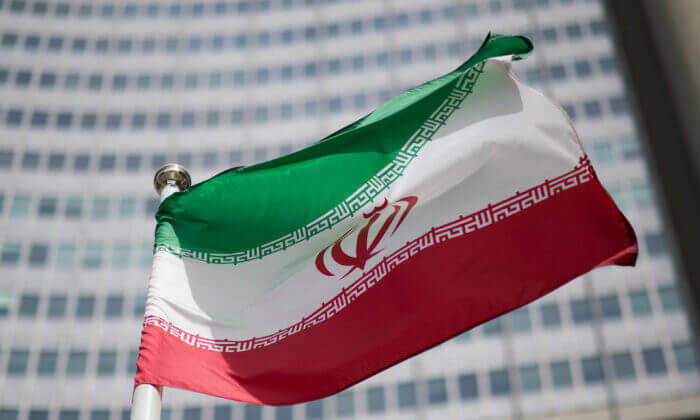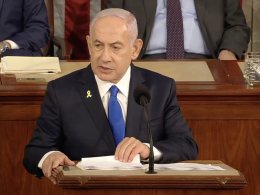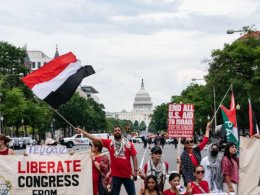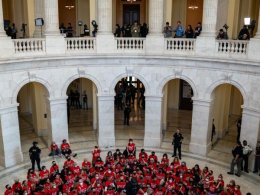If the Iranian regime doesn’t agree to a nuclear deal soon, the UK will consider “all options” with its allies, including imposing E.U. sanctions, a British minister said on Thursday.
The comments came after MPs warned that the prospect of a nuclear-armed Iran is “imminent,” but a weak nuclear deal “probably isn’t worth the paper it’s written on.”
Earlier this month, the governments of the UK, France, and Germany said they were “ready to conclude” a deal that would restore the Joint Comprehensive Plan of Action (JCPOA) despite the fact that the Iranian regime was installing additional advanced centrifuges and declared it would end all JCPOA-related transparency measures.
MPs said on Thursday that the continued efforts to engage with the “rogue” regime “increasingly seem futile,” and proposed the government should forget about a deal and restore sanctions instead.
The JCPOA, signed in 2015, enshrined the cessation of many sanctions against Iran in exchange for the delaying of its nuclear program and giving up most of its enriched uranium.
The deal started to fall apart since the United States pulled out in 2018, saying the Iranian regime had been hiding its secret nuclear weapons program for years. Iran officially declared in 2020 that it would no longer abide by the JCPOA limits following the United States’ killing of Iranian Gen. Qassem Soleimani.
Parliament on Thursday unanimously voted to express “grave concern at the imminent prospect of a nuclear-armed Iran”; call on the government to tighten the terms of the JCPOA by trying to extend the sunset clauses and enact a stricter monitoring regime; and retain Iranian terrorist organisations as well as adding “Iran’s other destabilising activities in the region” onto the UK’s proscribed list.
Conservative former minister Robert Jenrick, who proposed the motion with former Labour whip Steve McCabe, warned that Iran is now “on the verge of possessing a nuclear bomb.”
Jenrick said intelligence suggests that Iran has enough enriched uranium for “at least two nuclear weapons,” adding, “They have progressed far beyond the parameters of the JCPOA.”
Jenrick argued that restoring the old deal “doesn’t have any of the benefits we once thought it would,” saying: “The JCPOA’s time has been and gone, the Rubicon has been crossed.”
McCabe and Conservative David Jones were skeptical about the utility to keep engaging with Iran, suggesting the UK and its allies should refer the regime to the UN Security Council in order to reinstate the pre-JCPOA sanctions.
The MPs argued that the sunset clauses in the deal meant it “would begin to fade away in 2023,” with the plausible prospect of a new Republican U.S. administration pulling out again, therefore there’s little benefit in reviving the deal, while doing so would weaken the UK’s relationships with Israel, Saudi Arabia, the Gulf States, and others which had been “pleading” with the UK government not to proceed with the deal.
Withdrawing the United States from the JCPOA in 2018, former U.S. President Donald Trump criticised the Obama-era deal as a “horrible, one-sided deal that should have never been made.”
Speaking on behalf of the government, Foreign Office minister Vicky Ford told Parliament that she shares their grave concerns over the potential for a nuclear-armed Iran.
But she also insisted that a restored JCPOA would “provide a foundation for international diplomatic efforts to ensure that Iran’s nuclear program remains peaceful in the long term.”
The minister promised that the Iranian regime will not get a better deal than what’s currently on the table, and the government will prioritise getting the extension of the sunset clauses and enabling a stricter monitoring regime if Iran returns to the JCPOA.
But she also stressed that if a deal is “not struck soon,” the JCPOA will collapse.
“And we will then, in that scenario, carefully consider all options in partnership with our allies—options that may include E.U. sanctions,” the minister said.
Jenrick also called for the UK government to proscribe Iran’s Islamic Revolutionary Guard Corps (IRGC) as a terrorist organisation, describing it as “Iran’s premier agent for terrorism.”
Speaking of media reports that said the United States is considering removing the IRGC from its foreign terror list as a concession in order to revive the JCPOA, Jenrick said delisting the group would be “a grave miscalculation and a great dishonor” on the part of the Biden administration.
He also said the UK supporting such a deal, which”legitimises the very organisation that funds Hamas and Hezbollah,” would “make a mockery” of the UK’s efforts to proscribe Hamas and Hezbollah as terrorist groups.
Ford said the government does maintain “a range of sanctions” that constrains IRGC’s destabilising activity throughout the region.
The minister said the UK’s list of proscribed terrorist groups is “kept under constant review,” but declined to speculate on possible future designations.
Jenrick also criticised E.U. High Commissioner Josep Borrell and French President Emmanuel Macron over “an ill-advised pivot” toward Iranian oil and gas when the E.U. “desperately tries to wean itself off Russian hydrocarbons” after Russia’s invasion of Ukraine.
Visiting Tehran last week, Borrell said that he was “convinced” that there is “enormous potential” in the bilateral relations between the E.U. and Iran, “starting from trade—including oil and gas—to many other issues.”
A French presidency official reportedly said on Monday at the G–7 summit in Germany that all options should be explored to source oil and gas, including talks with Iran and Venezuela.
Jenrick said the West can’t afford to “end its dependency on one rogue regime merely by pivoting towards the religious fundamentalists in Tehran,” arguing it would be “ridiculous” that the UK invests “so much time, effort, and energy” in defeating Russia only to get cozy with Tehran, Venezuela, or other authoritarian regimes.










